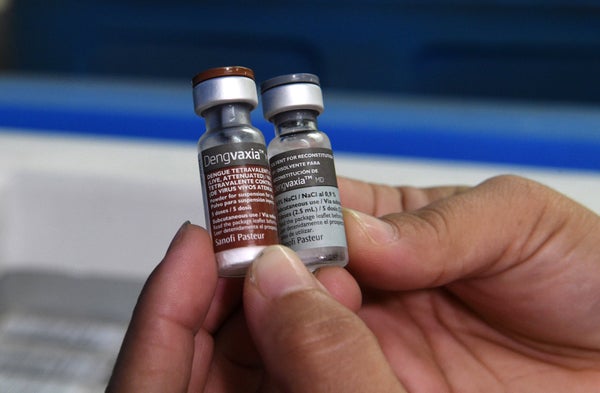Newly published data reveal in greater depth the problem Sanofi Pasteur’s Dengvaxia vaccine poses to children who have never experienced a dengue infection.
The findings, first revealed by the company last November, were the basis of an April decision by a World Health Association expert panel to recommend the vaccine only be given to children who have tested positive for a prior dengue infection. There is no such test at the moment.
Despite the publication in the New England Journal of Medicine, a Sanofi official said the company remains committed to finding a way to allow the vaccine to be used safely to reduce dengue’s enormous health care burden.
On supporting science journalism
If you're enjoying this article, consider supporting our award-winning journalism by subscribing. By purchasing a subscription you are helping to ensure the future of impactful stories about the discoveries and ideas shaping our world today.
“It would be a travesty not to fully leverage the benefits of this vaccine in the context of public health. So we are absolutely behind that, trying to make it work,” Dr. Sanjay Gurunathan, head of global clinical sciences for Sanofi Pasteur, told STAT.
Gurunathan did acknowledge, however, that it will be essential to get easy, affordable, and accurate point-of-care tests into the hands of health professionals who would be administering the vaccine.
“I think the ease of using the test or the availability of having a rapid test is absolutely crucial in the success of implementing such a vaccine,” he said.
Outside the company, it isn’t difficult to find observers who believe the future is not bright for Dengvaxia. Having to test each child before administering the vaccine will sharply undermine its usefulness, they say. In countries where the infections are endemic, there is a need is for the kind of mass vaccination campaigns that Dengvaxia was used in in the Philippines, before the problem came to light.
“It is going to reduce uptake of the vaccine, there’s no question,” said Dr. Anna Durbin, a vaccine researcher at Johns Hopkins University in Baltimore. Durbin has been involved in the testing of an as yet unlicensed dengue vaccine being developed at the National Institute of Allergy and Infectious Diseases.
The basic findings of the newly published study have been known for months—and suspected for longer.
There are four different types of dengue viruses, and infection with one does not protect against infection by the others. In fact, severe dengue infections more commonly occur when people experience a second dengue infection.
It’s believed the decline of antibodies generated by the first infection actually exacerbates the second infection, a phenomenon known as antibody-dependent enhancement, or ADE. And in children who have never had dengue, it appears that the vaccine acts like a first infection.
The clinical trials Sanofi conducted to bring Dengvaxia to market showed a higher hospitalization rate among young children ages 2 to 5 who received the vaccine. The vaccine was licensed for use in children 9 and older, but the WHO’s vaccine advisers urged Sanofi to look into what was happening with younger children.
Using a test developed expressly to explore the issue, the researchers examined blood samples that had been taken from about 5,600 children who had been in the clinical trials that led to the vaccine’s licensure.
The authors found that while the vaccine offered significant benefit to children who had had at least one previous dengue infection, for children who had never contracted the disease, it increased their risk of a severe infection.
The study said that if 1 million children aged 9 to 16 were vaccinated, 12,000 hospitalizations for dengue would be avoided in children who had previously had dengue, but 1,000 children who were dengue naïve would go on to be hospitalized for dengue. Likewise, 3,000 severe dengue infections—which can be life-threatening—would be avoided but 500 would be caused.
“There is no doubt that there is a population benefit … but there is an individual risk to the vaccine,” Durbin said. “If you don’t test before you vaccinate, then there are individuals who will be hospitalized for dengue because they were vaccinated.”
That risk is unacceptable, insisted Dr. Scott Halstead, a dengue expert who first described the ADE phenomenon decades ago.
“My position is that ‘we’ don’t have the right to knowingly place healthy individuals at risk to harm, especially if harm can be avoided,” Halstead said in an email.
After studying the data, the WHO’s Strategic Advisory Group of Experts on Immunizations—knows as the SAGE—recommended the vaccine only be administered to children who had tested positive for a previous dengue infection. But there isn’t a validated point-of-care test at the moment.
Sanofi has been analyzing the tests that exist and feels that some could be adapted to serve this function now, Gurunathan said. A pilot study is underway in Brazil to see if how feasible it is to use the vaccine in this way, he said. “It’s our estimation that over the next couple of years, we will have a second-generation test that’s highly optimized for this purpose,” he added.
Requiring health professionals to test each child before administering vaccine will be cumbersome and add to the cost of using this vaccine—a fact Gurunathan acknowledged. A test will have to be easy to use, fast and accurate.
“If you have a test available which takes a month to get the results from the lab, and then you have to go back again and vaccinate, it’s not going to work,” he said.
Dengvaxia has been licensed in 20 countries, including Argentina, Australia, Brazil, Mexico, and Thailand.
Sanofi has talked in the past about applying to the Food and Drug Administration to license the vaccine in the U.S. But the company hasn’t made a decision yet whether it will do so, Jack Cox, head of global media relations, said Wednesday.
Republished with permission from STAT. This article originally appeared on June 13, 2018
